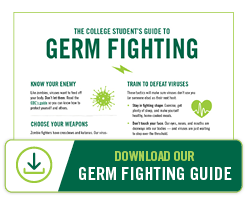The College Student's Guide to Germ-Fighting
By Emily Young | Last Updated: Nov 12, 2025

It’s respiratory season — which means each of us is a recruit in the war against germs. Who wants to miss weeks of class (and parties) because of the flu? Not us! That’s why we’ve created a guide to help you succeed in this epic battle of humans versus virus.
Join the war against disease with this zombie-inspired germ-fighter’s guide for college students.
Know Your Enemy
Your enemy is invisible. It’s not exactly alive, but it’s not dead either: It could be best described as “near the boundary between the living and the nonliving.” Once inside its victim’s body, it leads a borrowed life. And it wants to use you as its next host.
“You can’t scare a virus. You can’t negotiate with a virus. You can’t make a separate peace with a virus. A virus has a biological imperative, which is to infect and spread,” says Max Brooks, the author of The Zombie Survival Guide.
But you can fight it.

Know Why It Matters
OK, some of our zombie analogies might be dramatic. But the truth is, you are being a hero when you stop the spread of germs. Millions of your fellow Americans are disabled or immune-compromised, and you can’t always tell by looking at someone whether they’re at risk. A mild infection might seem like no big deal to you, but it could be life or death for the person sitting next to you in class.
Plus, even if you’re healthy and able-bodied right now, that could change in an instant. Some respiratory viruses can cause years of debilitating symptoms, including extreme fatigue and changes to the brain similar to Alzheimer’s. These long-term symptoms are more likely to affect young people between 18-44 — which is why you don’t want to get sick.
Choose Your Weapons
You wouldn’t fight a zombie without proper gear, would you? A viral invasion is no different. Choose your weapons:
Soap and Water
This is your basic virus-destruction kit. It may not seem like a glamorous weapon, but that’s only because you can’t see how efficiently it destroys your viral enemy.
“Soap disrupts the sticky bond between pathogens and your skin,” explains Dr. Daniel Pastula, a neuroinfectious disease expert. “Not only are you neutralizing the virus with the soap, but you’re also physically knocking it off your hands. Hand sanitizer doesn’t do all of that.”
Hand Sanitizer
Think of it like this: When fighting the undead, you’d like to be working with a handgun. But sometimes you’re caught off-guard and need to reach for the nearest weapon, like a rusty nail to jam through the zombie’s eye socket.
Hand sanitizer is that rusty nail. Soap and water should be your go-to weapon. But you should also have a backup supply of hand sanitizer, just in case you don’t have access to your top choice of defense.
Pro tip: When buying hand sanitizer, make sure it has at least 60 percent alcohol.
Clean Air
Seasoned zombie fighters build barricades to keep out the undead. Our version of a barricade? An air purifier.
Respiratory viruses can gather, invisibly, in the air you breathe. Air purifiers help clean that air. Large ones can get pricey, but you can always put them on your holiday wish-list or even make your own.
When you’re in crowded public spaces, you might also consider donning a mask. Masks aren’t required on most college campuses like USF anymore, but they can reduce your risk of getting sick (and protect the people around you).
Wield Your Weapons
You’re armed and ready. But do you know how to use your store of germ-fighting weapons? Time to train.
Soap and Water
When washing your hands, follow the classic zombie-fighting advice: Double tap. Sing the happy birthday song once; then sing it again. This ensures you’ve washed your hands for enough time (at least 20 to 30 seconds) to knock off those germs.
Take extra care to suds up in these circumstances:
- After using the bathroom
- Before preparing or eating food
- After touching garbage
- After blowing your nose, coughing, or sneezing
- After being in a public place

Hand Sanitizer
Avoid these pitfalls:
- Not using enough. Make sure you coat every part of your hands with the sanitizer.
- Not waiting long enough. Give it time to air dry, about 20 seconds.
Stay Healthy
You want to be in fighting shape to defeat zombies. The same is true for fighting viruses.
Build Exercise into Your Routine
“Just a few hours of moderate exercise spread across a week is enough to get your immune cells circulating optimally,” according to a biology professor cited in this New York Times article. “And the exercises don’t have to be intense — just walking, dancing or ‘vigorous yard work’ is enough to experience a boost in your health.” USF offers students group and personal fitness classes (bonus: you can recruit your zombie-fighting army here).
Prioritize Sleep
Get at least eight to nine hours of sleep every night. In one study, people who were exposed to a cold and then got less than six hours of sleep were four times more likely to get sick than those who slept seven plus hours. If you’re a USF Bull who’s having trouble sleeping, drop by the Center for Student Wellbeing for help snagging more zzzz’s.
Eat Healthy
Aim for a healthy diet rich in whole grains, protein, fruits, and vegetables. If you need inspiration, USF has you covered with these dorm-friendly recipes. Bulls can also visit a registered dietitian on campus.
Get Your Seasonal Vaccines
Stay up-to-date with seasonal respiratory vaccines, which bolster your immunity against viruses. Your college campus may even offer these for free! If you have any concerns, drop by your school’s health clinic and talk to a doctor about a vaccine decision that’s right for you.
Learn the Skills of Seasoned Germ-Fighters
Now it’s time to master the skills of experienced germ-fighters.
Don’t Touch Your Face
We are obsessed with touching our faces. But our eyes, noses, and mouths are doorways into our bodies — and viruses are just waiting to step over the threshold. (Scratching your nose is the equivalent of inviting a zombie for dinner and expecting them not to have you as the main course.)
Next time you feel the urge to touch your face during class, give your hands something else to do, like squeezing a stress ball.
Don’t Spread Germs
Don’t be that person in the zombie movie who leaves the camp, gets their arm bitten, wears suspiciously long sleeves in the summer heat while saying “I’m fine, y’all,” and then, bam, starts mouth-foaming and tries to eat everyone in the camp.
Make sure you aren’t spreading germs:
- Before you cough or sneeze, cover your mouth and nose with a tissue. Throw away the tissue and wash your hands.
- You can also cough or sneeze into your elbow.
- If you feel sick and can’t stay home, wear a mask around other people.
- Use at-home rapid tests if you have symptoms or are going to visit someone vulnerable to make sure you’re not infectious.

Stay Informed
Knowledge is power. Check out local wastewater data to track the spread of viruses in your area and determine what level of precautions you want to take. Visit your campus health clinic for regular check-ups. Subscribe to public health newsletters. Watch The Last of Us and pretend those spores are cold/flu germs.
Be Brave; Be the Difference
Most zombie movies feature a dramatic scene where the hero fights off the undead in a theme park or finds a cure to the pandemic. Real life doesn’t always feel this exciting, especially when you’re slathering on hand sanitizer in the school cafeteria. But trust us, if you follow the steps in this guide, you will be a germ-fighting hero.
And remember that if you need us, USF’s Health and Wellness centers are here to support you.



